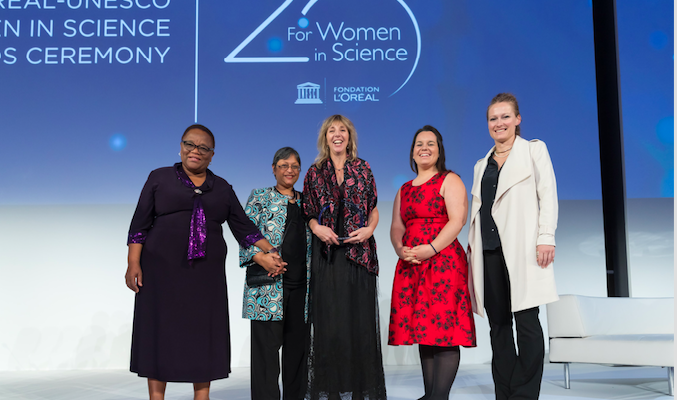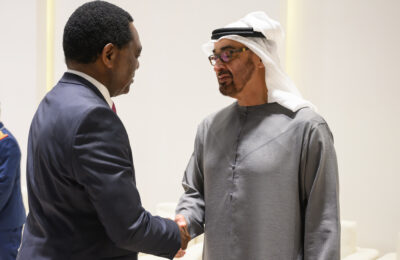The L’Oréal Foundation and UNESCO honor five exceptional female scientists and 15 young scientists with the 2018 L’Oréal-UNESCO For Women in Science Awards
Women continue to be under-represented in public and professional life particularly in science where the glass ceiling is still a reality. Today only 28% of scientists are women of which only 3% have been awarded Nobel Prizes for Science since the awards began in 1901.
Despite this there are many eminent women scientists and raising their profile is vital to promoting greater gender equality in science. Annually for the past 20 years, the L’Oréal Foundation has recognized five exceptional female scientists and fifteen promising scientists in partnership with UNESCO and taken the initiative to improve the balance of women and men in science.
THE 2018 LAUREATES: EXCEPTIONAL WOMEN IN SCIENCE
Each laureate will receive a prize of €100,000 and honored for her contribution in the fields of medicine, paleontology, molecular biology, ecology and developmental biology. Professor Heather Zar from the University of Cape Town and Red Cross Children’s Hospital has been honoured for establishing a cutting-edge research program on pneumonia, tuberculosis and asthma, saving the lives of many children worldwide.
“In contrast to the aging populations of wealthy, developed countries, in Africa, children make up almost 50% of the population. Too many of them succumb to diseases that could be prevented or treated. Pneumonia affects 36 million children across Africa each year and is fatal in more than 700,000 children globally with nearly 60% of these deaths occurring in Africa” explains Heather Zar.
The rate of tuberculosis infection on the continent is among the highest in the world, and asthma affects between 10 and 20% of children. Heather Zar has dedicated her career to improving the diagnosis and treatment of these common causes of childhood illness and mortality in her native South Africa, “I have always felt a strong commitment to work in areas where there is a real need,” she says.
In a continent where resources are in short supply, Professor Zar has adopted a pragmatic approach, focusing on the prevention, diagnosis and treatment of diseases with the greatest impact. She has developed simple tests to diagnose tuberculosis and pneumonia in children from spit and nasal swab samples, which have been integrated into global World Health Organization (WHO) guidelines. She demonstrated that preventative use of a common tuberculosis treatment, the antibiotic “isoniazid”, reduced mortality by 50% and tuberculosis incidence by 70% in HIV-infected children who were not undergoing antiretroviral therapy.
Heather Zar is committed to reducing health inequalities in the world. Her drive to become a scientist began the day her aunt and uncle brought her into their laboratory; her preoccupation with social justice came from her own parents. “Being a pediatrician and clinician-scientist combines my desire to advance knowledge with my need to improve children’s lives,” she reflects.
As part of the 20th anniversary celebrations, former award winners from across the world joined the move to support and empower female scientist who are addressing key issues. 2016 Laureate, Professor Quarraisha Abdool Karim who was previously honoured for her contribution to HIV/Aids prevention in young girls, was also in attendance. “It is spectacular to see the dedicated efforts and contributions women are making to societal transformation being showcased!” says Abdool Karim. “Notwithstanding, the programme now in its 20th year has demonstrated unequivocally the life changing cutting edge state of the art science that is both locally relevant and globally important being generated by women in all disciplines across the world.”
THE 2018 L’OREAL-UNESCO FOR WOMEN IN SCIENCE INTERNATIONAL RISING TALENTS
The L’Oréal Foundation and UNESCO have supported 3,022 talented young female scientists through research fellowships. These L’Oréal-UNESCO For Women in Science fellowships are awarded annually at national and regional ceremonies held in 117 countries.
275 young women benefit from national and regional fellowships each year. Out of these 275, the International Rising Talents programme selects the 15 most promising scientists.
Danielle Twilley from the University of Pretoria received the International Rising Talent award for research in targeting angiogenesis for the treatment of melanoma. Skin cancer is one of the most common types of cancer in South Africa. Melanoma is the most dangerous type of skin cancer with approximately 86% of melanoma cases attributed to sun exposure. She is seeking to find out whether a compound isolated from a South African plant, which she found in previous research to have significant cytotoxicity (the quality of being toxic to cells) towards melanoma cells, is able to inhibit both angiogenesis and tumor growth.
To minimize damage to healthy cells while delivering powerful doses to the tumor environment, she is developing the anti-angiogenic agent into gold nanoparticles to target the delivery to the tumor and its vascular network. Mrs. Twilley explores indigenous knowledge of plant-based medicines for application in skin cancer, finding one traditionally used plant with high antioxidant content that boosts the SPF of a sunscreen. She is highly engaged in product development, undertaking patenting processes that assure benefits to indigenous communities, planning clinical trials and dealing with manufacturers
















